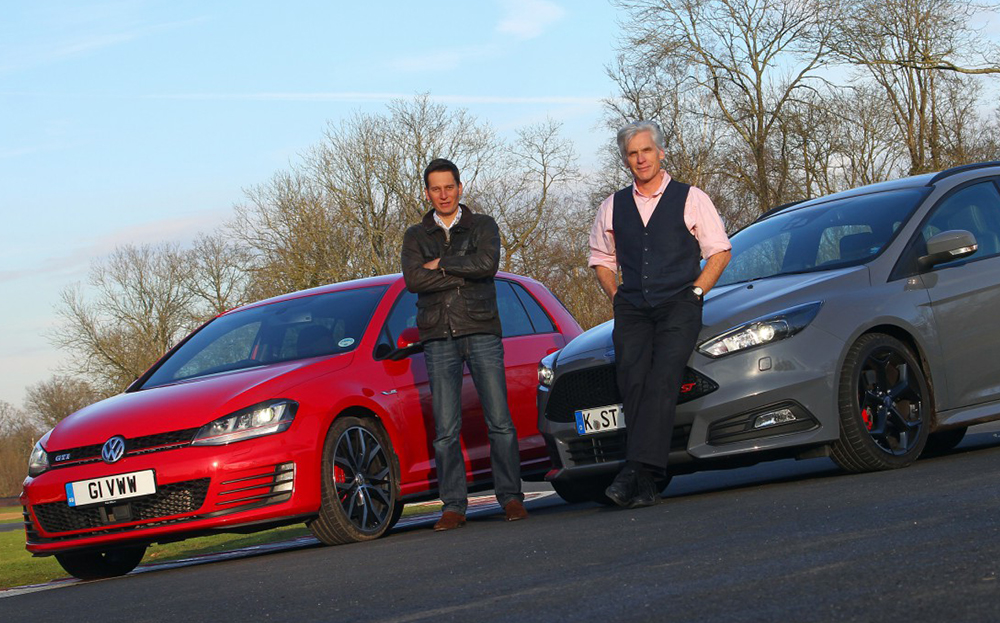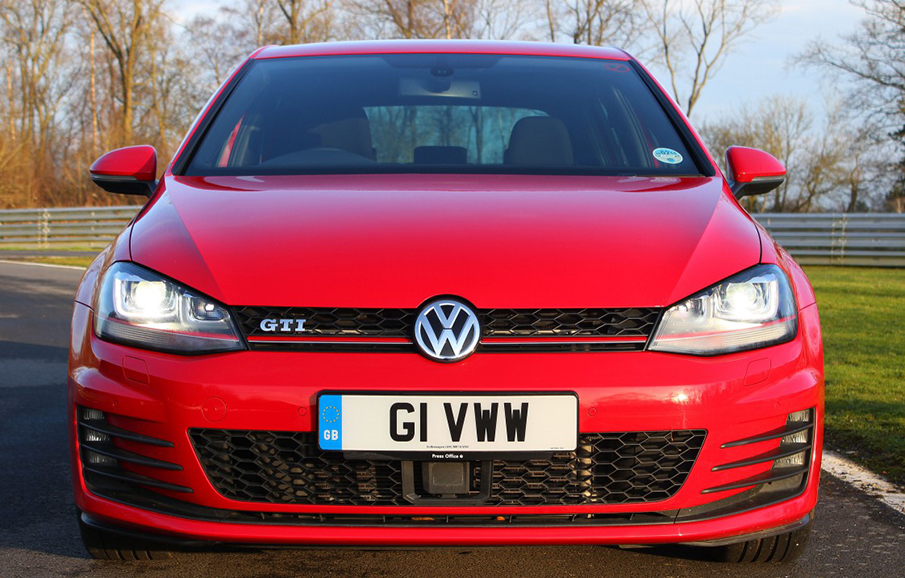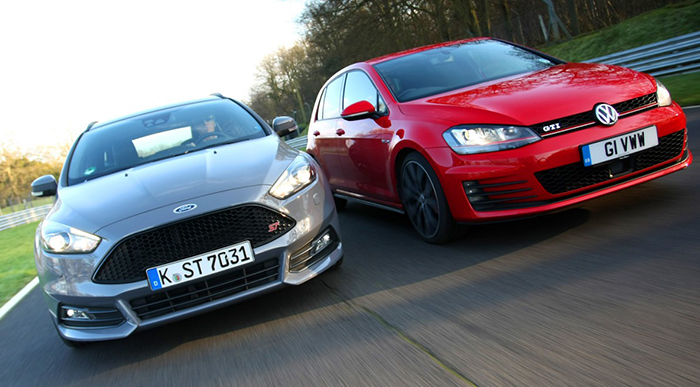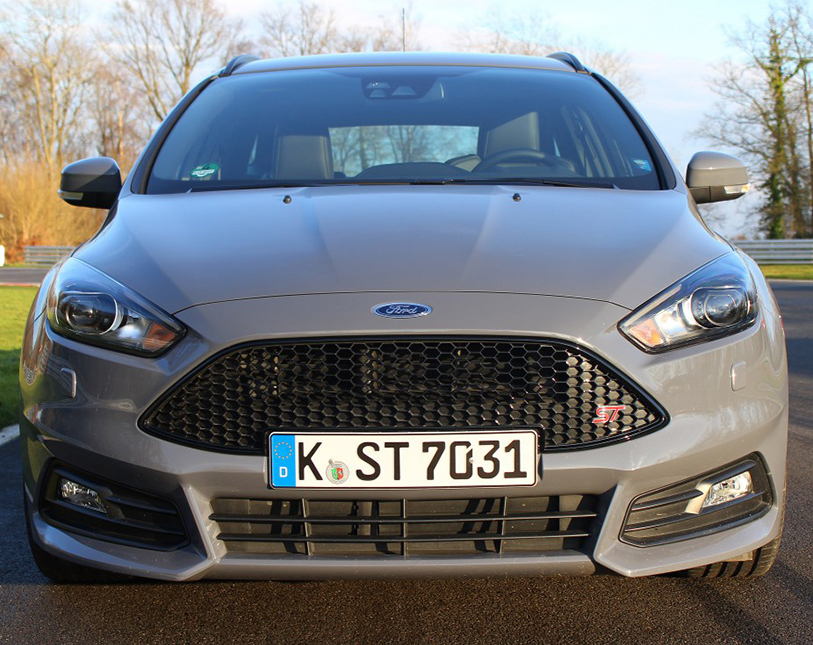Battle of the hot hatches: VW Golf GTI v Ford Focus ST
My, haven’t you boy racers grown up

A decade after Driving first pitted the VW Golf GTI against the Ford Focus ST, James Mills and Nick Rufford line up their latest offspring. So which rules the road now?
VW Golf GTI, £29,645 (with Performance Pack)
I SEE Nick arrive before he sees me, and there appears to be a problem. Well, several problems actually. First, who forgot to paint the car? It’s wearing what looks to be Humbrol AA0014, otherwise known as “grey primer matt” enamel paint. If you spent some of your childhood painstakingly assembling Airfix models of HMS Ark Royal, a Supermarine Spitfire or Panther tank, the distinctive shade of primer on our Ford Focus ST will bring back memories of picking apart glue-covered fingers and sniffing at the small tin of primer as the lid pops off.
Browse the used VW Golfs for sale on driving.co.uk
Then there is the car’s styling. I know Ford has been busy giving the Focus ST a makeover for 2015 but since when was the most desirable version of the company’s hottest hatch an, er, estate car? Choosing a performance estate is a bit like an aspiring professional racing driver saying their dream is to make it to Formula One . . . and race for Caterham, the last-placed team on the grid.
Ford says the estate has proved a reasonably popular addition since it joined the range in 2012, accounting for a tenth of annual Focus ST sales in the UK. Presumably these are the boy and girl racers who, after having children, couldn’t bear to be wrenched away from their hot hatch because the pushchair and travel cot wouldn’t fit into the boot.
So why hasn’t Volkswagen done the same? Well, in fact it is about to follow Ford’s lead: at the Geneva motor show next month the company will reveal the Golf GTD estate, a 181bhp diesel for dads in a hurry. Is this a rare admission that the car that twisted the ignition key on the hot hatch movement back in 1977 is being caught up — overtaken, even?
Pah. Nonsense. The diesel-powered estate is still a niche within a niche, whereas the petrol-engined hatchback remains the GTI thousands of British drivers buy and hundreds of thousands more hanker after. And all it takes is one short drive to see why.
Much to the annoyance of engineers at Ford, Honda and Seat, Volkswagen has honed the GTI to a point approaching perfection. The car’s suspension can be adjusted via a touchscreen so that it can be comfortable on the slog to the office and sporty on a Sunday morning run to, um, “collect the papers and milk” via that 20-mile winding B-road.
Best of all, it really works. Where some cars with such gadgets are either as bouncy as a puppy or as scary as an attack dog, the GTI feels just right all of the time.
Volkswagen calls this suspension system Dynamic Chassis Control and it’s an £815 option on the GTI. It adjusts the response of the dampers according to the driver’s chosen settings or, when left in Normal mode, can actively make adjustments based on the driving conditions — such as when rushing back home with Friday night’s takeaway.

When you do rush, the response from the steering, throttle, brakes and (optional) direct-shift gearbox is always unflinching. They get on with the task at hand and work as a team to make the driver feel as though they could trust the GTI come hell or high water. And with the £995 Performance Pack on the car I drove, which adds 10bhp to the engine’s output, comes an electronic locking differential that helps contain the engine’s ample performance. (Although on winter roads and wearing regular Dunlop tyres our test car still struggled for grip in the first two gears.)
And what an engine. The 2-litre turbocharged four-cylinder unit is an absolute cracker. It isn’t new, rather a development of the one that powered the previous-generation GTI, and is codenamed EA888. Yet subtle tinkering to the cylinder head has helped improve its fuel economy by 18%, says VW, and reduce CO2 emissions so that now even the Performance Pack model returns a quite saintly 47.1mpg. With petrol prices as low as they are, why buy diesel?
There appears to be no end to its talents; it can pull with gusto from right at the bottom of the rev range and rev enthusiastically to the red line, plus it sounds great and, best of all, doesn’t run out of puff like an asthmatic in a school running race. Still want that diesel-powered ST?
It’s all a far cry from the model that turns most fans of the hot hatch misty-eyed: the 16-valve GTI Mk 2. Like a toy car, that engine needed winding up before it would do any work, whereas turbocharging and direct fuel injection allow today’s GTI driver to have their cake and eat it.
This is the seventh time around for the GTI and some drivers out there have owned one of each, although probably prefer not to talk about the Mk 3 and Mk 4. They marked a low point for the Golf — like the Steve Martin unfunny years — and allowed companies such as Peugeot to come along and steal VW’s thunder.
VW got its act together for the Mk 5 and hasn’t looked back since — and not only in the way the GTI drives. The styling is just the right side of tasteful and, as ever, the cabin provides a masterclass in sound ergonomic design. This might be one of the most expensive hot hatches on sale but everything about it justifies the price. James Mills
Verdict ★★★★☆
You’ll like everything but the price
Volkswagen Golf GTI DSG specifications
- Engine: 1968cc, 4-cylinder petrol
- Power/Torque: 227bhp/258 lb ft
- Transmission: 6-speed automatic
- Acceleration: 0-62mph in 6.4sec
- Top speed: 154mph
- Fuel: 47.1mpg
- CO2: 139g/km
- Road tax band: E
- Price: £29,645 (with Performance Pack)
- Release date: On sale now

Ford Focus ST, £27,095
ANOTHER week, another wintry afternoon at a racetrack putting a pair of practical performance cars, the Golf GTI and a new Ford Focus ST, through their paces. It seems only . . . hang on, let me check. Crikey, can it really be 10 years since we got these two cars together?
Apparently so, because as I write this I can see my younger self staring out from a newspaper cutting with a blustery Silverstone in the background. Back then the Focus ST was the newcomer trying to challenge the Golf GTI’s dominance of the market.
Browse the used Ford Focus for sale on driving.co.uk
It was as though the original petrol-powered ST, a racy derivative of Britain’s bestselling Ford Focus, was the young contender taking the fight to the champ of hot hatches. Powered by a fantastic five-cylinder Volvo-derived 223bhp engine (the Swedish car maker was then owned by Ford), the ST boasted a 10% power advantage over its GTI rival.
The only way we could fault it at the time was by pointing out that, unlike the plainer-looking Golf, it had a distinct boy-racer air that would be frowned on by the valet parkers at, say, the Hôtel de Paris Monte-Carlo. That and the fact it was bright orange with matching interior that gave one the disconcerting impression of driving a giant tangerine. Those points aside, the ST was technically every bit as good as its costlier counterpart.
Now comes an all-new version of the ST, this time in a nicely understated grey that moodily catches the light here at Brands Hatch. It’s taken off its bomber jacket and put on a business suit. A sculpted bonnet and slimmer headlights lend a new look of sophistication, while a chunkier grille, LED lights and hexagonal exhausts hint that this car still means trouble.
But the main difference is under the bonnet; Ford’s latest secret weapon is a tuned turbodiesel engine. This, says the company, gives the ST smoother power delivery, low-down grunt and loads of torque so you can whizz through the twistiest roads with barely a gearchange. In short, the kind of performance to deliver a knockout blow to its German opponent.
First, the good points. The steering is good — tight and accurate — and the fuel economy is impressive at a claimed 67.3mpg; the sort of level that could even make this suitable as a company car. And, er, that’s it. Even putting aside the fact that an increasing number of councils are now punishing car owners for a crime they didn’t commit by charging a diesel levy on parking permits, there is little to recommend this car.
I’ve racked my brain to think of good things to say but all of them seem slight compared with the fact that the engine just isn’t up to it. Forgive the deviation into numbers, but the Golf GTI with the Performance Pack hits maximum torque at 1500rpm and stays there through to 4600rpm. For even better acceleration you can drive it like a sports car in the maximum power range, which is from 4700rpm to near the red line at 6200rpm. In other words, if you’re happy to burn a bit more fuel and let the engine race, it’s great fun (and the engine will come to no harm).
In contrast, the ST’s maximum torque arrives at about 2000rpm — not much later than the Golf’s — but it starts to tail off from about 2750rpm. Sure, it’s got torque aplenty when you’re in the right gear but you need to change up by 3000rpm or it’ll start to feel gutless. Peak power comes a fraction later in the rev range but the engine doesn’t give you much more pulling power than at lower speeds. There’s not much point in revving then — it won’t deliver any extra oomph.

The acceleration figures bear this out. From standstill to 62mph in the Focus takes a glacial 8.3 seconds compared with 6.4 seconds for the Golf. The ST hatchback is only 0.2 seconds quicker.
So why would Ford ruin a perfectly good hot hatch by putting a diesel engine in it, albeit one with a relatively generous 182bhp (34bhp more than the standard TDCI Focus)? Possibly the weary Ford engineers warned against it but the suits won the argument. Somewhere out there, it seems, there is a market for a car that promises to combine the family-friendly running costs of a diesel with the thrills of bachelorhood. (Ford isn’t alone in trying to exploit it; other manufacturers offer the same sort of thing.)
Naturally enough, Ford insists that its car’s 295 lb ft of torque (compared with 258 lb ft for the Golf GTI) gives it enough urge to justify the ST badge on the boot. The trouble is the VW gives you the best of both worlds: good solid pulling power at low engine speeds, so it is easy enough to get around town in one gear, and on the open road it delivers ever-increasing speed as you keep the throttle buried in the floor mat and the revs climbing towards the red line.
The kindest thing to say is that Ford is saving its best performance for the new Focus RS, a 316bhp all-wheel-drive monster that is expected to go on sale in 2016. Unfortunately even that doesn’t get the company off the hook. The ST commits a worse sin than poor performance. Knowing perhaps that the clatter of a diesel engine is hardly thrilling, Ford has chosen to disguise it with an enhanced engine note.
Like the Peugeot 308 GT we reviewed recently, the ST’s engine sound is “overdubbed” by a “sound symposer”. The car’s computer uses an algorithm (based on throttle position, gear and loading) to create a “realistic” growl that is played inside the car through the speakers. Strangely enough, the soundtrack is tuned to make the car sound like the original ST.
When you’re cruising on the motorway, then, you can believe you’re in a petrol-powered hot hatch. Sadly, when the going gets challenging, the ST diesel drives like, well, a diesel. And where’s the fun in that? Nick Rufford
Verdict ★★☆☆☆
Feels as if you’re carrying a fridge in the back
Ford Focus ST-3 estate specifications
- Engine: 1997cc, 4-cylinder diesel
- Power/Torque: 182bhp/295 lb ft
- Transmission: 6-speed manual
- Acceleration: 0-62mph in 8.3sec
- Top speed: 135mph
- Fuel: 67.3mpg
- CO2: 139g/km (combined)
- Road tax band: B
- Price: £27,095
- Release date: On sale now
Read more: Buying Guide: Five brilliant hot hatches for under £10,000




